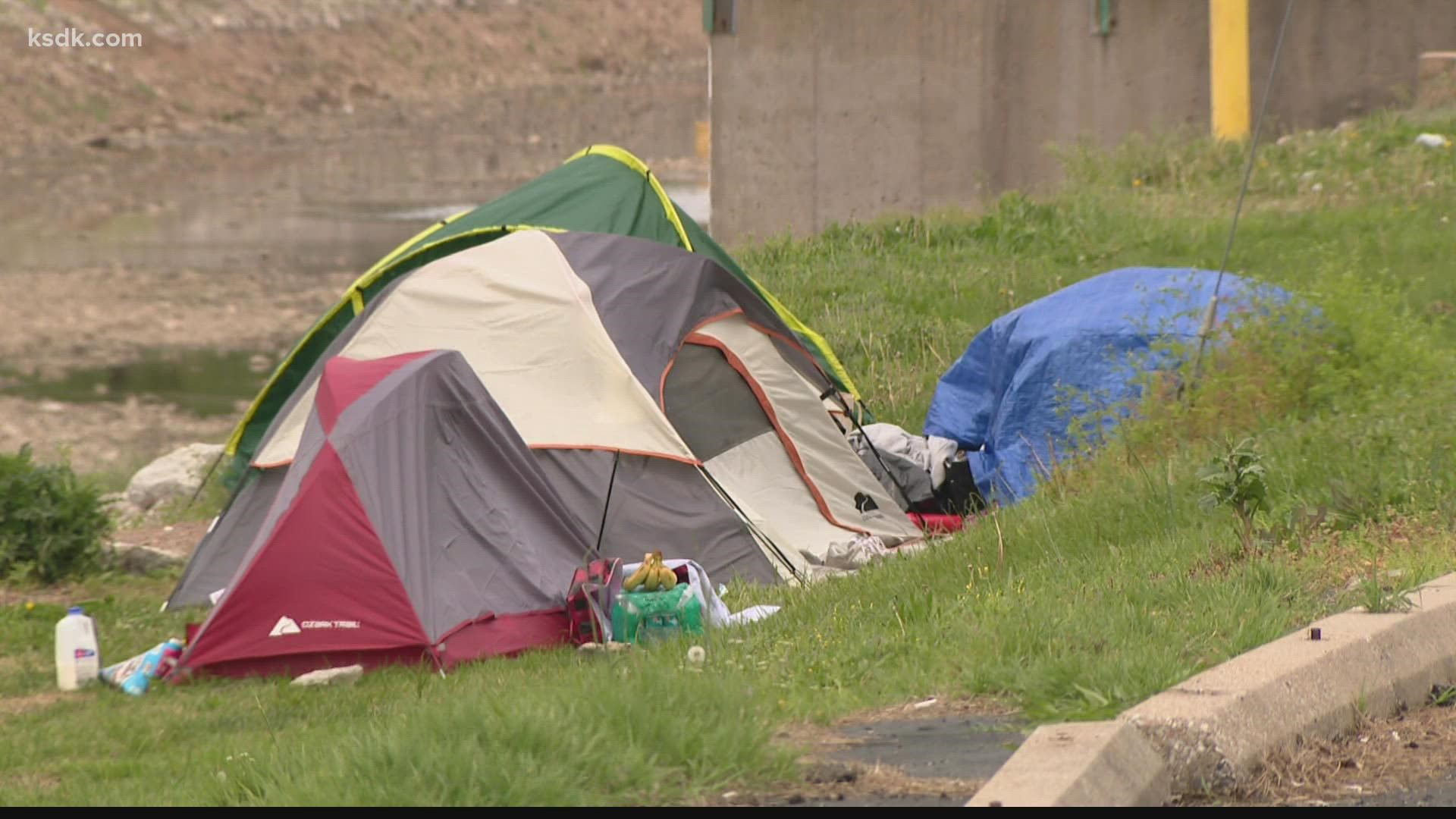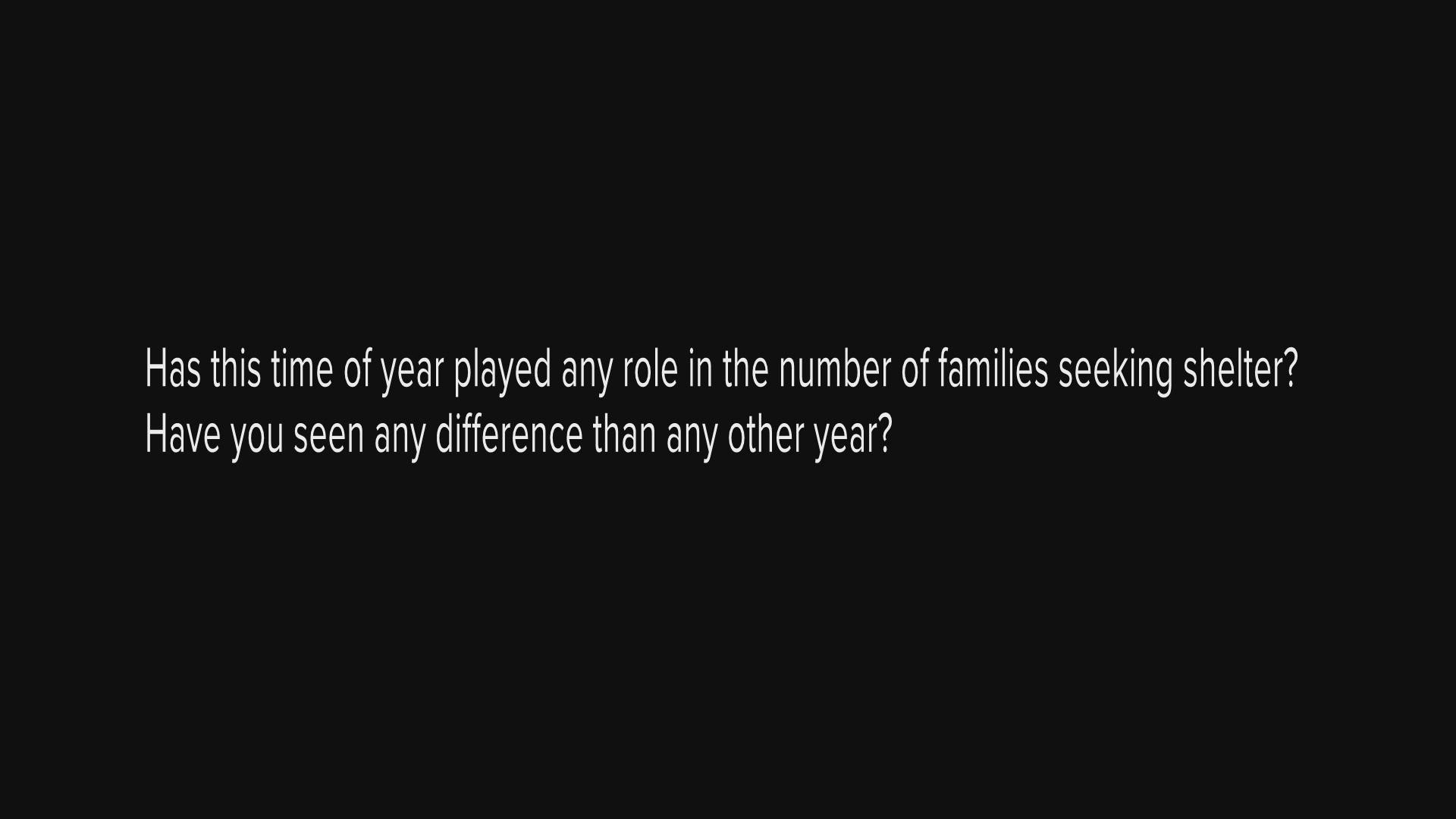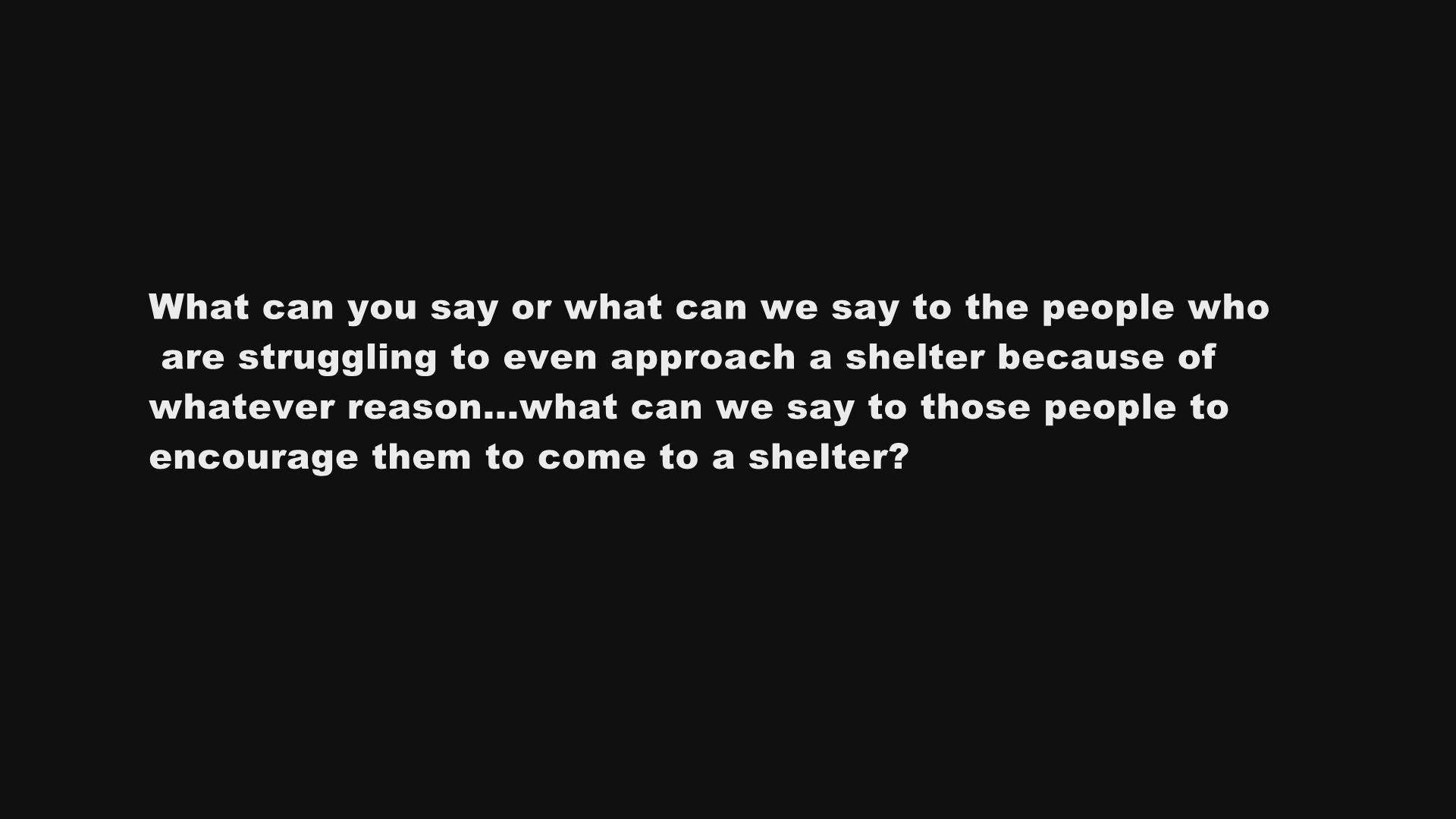Barriers remain for people experiencing homelessness in St. Louis
This is part one of a two-part series on the barriers to the condition of people experiencing homelessness this winter.

5 On Your Side has reported on issues impacting people facing homelessness throughout the City of St. Louis, among others across the United States.
COVID-19 lockdowns of schools and non-essential jobs, unpaid or late rent and utility payments, childcare shortages and eviction enforcement have a role in the rise of homelessness and create a barrier to permanent housing. St. Louis politics proved to be another hurdle.
Political barriers A new Board of Alderman president brings hope
Alex Cohen, a co-founder of Tent Mission STL, which was founded right after the pandemic started, is a grassroots coalition of unhoused advocates uniting for crisis support of people experiencing homeless amidst the COVID-19 shutdowns.
Cohen said the coalition came out a week before Election Day to denounce 7th Ward Alderman Jack Coatar and what Cohen calls his moves against people experiencing homelessness. On Nov. 8, Coatar lost to former 15th Ward Alderwoman Dr. Megan Green for St. Louis President of the Board of Aldermen (BOA).
"Right after he was elected [to the BOA]— this was right after the closure of New Life Evangelistic Center downtown— he introduced a bill that required a vendors license to distribute food and blankets to people on the streets," Cohen said. "It would have also made it illegal…even if you had the vendor's license…to do anything from 11 p.m. to 6 a.m."
Cohen called the closure of "walk-up" emergency shelters, like the Matin House, especially repulsive.
"These business owners decided to open up their doors to be a shelter and later through word [of mouth], Jack [Coatar] notified the mayor at the time and said this is a problem property and should be shut down," Cohen said.
Cohen said the next day, there was a condemnation notice on the door. Cohen's group protested the closure by interrupting a regularly scheduled city hall meeting. The protest resulted in the reversal of the shelter's closure.
"Only they can tell you why, but it’s clear that the city needs to do more to address homelessness— both in the long term and immediately— since temperatures will be very cold this weekend," Coatar said via email to 5 On Your Side's questions about people experiencing homelessness in St. Louis.
Cohen said these closures harm people experiencing homelessness in the winter. He said instead, people create tent encampments where they can.
City leaders banned these "intentional encampments" from select city wards with Board Bill 2 in 2021.
This policy created a problem for those experiencing homelessness and their advocates. Coatar's 7th Ward is near where homeless providers already exist, and it's one of the better locations for advocates to keep track of people on the streets. Ward 7 was one such "off limits" area.
"I am for tent encampments as well as many other diversified and low-barrier shelter options," Cohen said.
Cohen said the city is 400 beds short compared to the past three years, and the least they could allow is for people to sleep in a tent.
Cohen said the coalition has a fantastic relationship with Green and hopes to keep that relationship.
Cohen said she was physically there trying to keep the emergency shelters open and helping the business owners to try to get through to the mayor to stop closures from happening.
Cohen agrees that although Mayor Tishaura Jones' administration has tried to help over the years, the city's assistance and partnership with homelessness services seems unstable.
One thing concerning Cohen's coalition this winter is that the city will no longer facilitate the "warming bus" initiative.
"It's basically a spot where you could go in the winter if you were unhoused and you could be filtered into the emergency shelter system via a warming bus right downtown," Cohen said. "But the city is not doing that this winter."
For years the city has relied on volunteer-based winter outreach, which helps the initiative and activates once the weather reaches a certain threshold.
When temperatures reach 25 degrees with any form of precipitation, volunteers activate. When temperatures reach below 20 degrees, volunteers activate no matter what.
Cohen said a person died of hypothermia last winter.
In 2021, 5 On Your Side reported on how the freezing cold and the challenges facing volunteers.
In an effort to save lives, volunteers drive around the city and take people to shelters, Cohen said. They are looking for a school bus to buy and operate on their own for this winter.
St. Louis leaders told 5 On Your Side last week that they planned to open 200 beds and make them available 24 hours a day starting Dec. 1.
Cohen said if grassroots groups didn't do outreach, many people would die.
"Winter comes every year and winter is exhausting," Cohen said. "St. Louis is really behind with homeless services…we don't even have the basics."
Lingering challenges post-pandemic Several families experiencing homelessness for the 1st time
Kathy Conners, executive director of Gateway180 or G180, which aims to empower individuals and adults to become independent and permanently housed in St. Louis, said more people have entered the homelessness services system in St. Louis as a whole.
Conners said the pandemic disrupted a lot, and as of this year, the citywide homelessness services system is seeing the impact, including G180.
Conners said the shelter had more full families, including the mother, father, and children. As of November of this year, the shelter housed six complete families with two heads of household.
"That's a pretty big number on average…and that's been maintained throughout the pandemic to now. We have more people coming into shelter and trying to get out of the cold," Conners said. "Shelter has been high in demand."
She said the shelter has been tremendously full, with up to 100% capacity from June onward.
"We're seeing a lot of families experiencing homelessness for the first time and we're seeing the barriers to housing become compounded by lingering issues of the pandemic," Conners said.
Most parents are already employed or looking for employment, she said. But, the irregularities in public transportation, including bus lines and routes, create havoc for parents to get to and from work. Also, G180 sees parents working hard to get their kids to and from school using public transportation.
Conners also said they see shortages of childcare creating a barrier for the families they serve. But, G180 provides transportation services and helps find and enroll kids in childcare services.
Conners said G180 serves as a "temporary home" for the families they house.
The main gym on the first floor accommodates 22 single women, with space for one to two smaller families if needed.
The second floor has seven rooms, two accommodating one family at a time. Typically serves as a temporary home to roughly 55 individuals.
The five rooms are large, dormitory-style, accommodating 12 to 20 individuals.
The fourth floor accommodates families, including male children ages 13 and above and a parent. There are ten rooms on this floor, with all rooms housing one family at a time.
Conners said they do not turn people away and serve as a temporary home with hopes of permanently housing families and individuals with their citywide partners.
In an interview, Conners discussed how those in need can apply and receive assistance.
City of St. Louis' funding Allocating funding to homelessness service providers
This year, the city received $250 million from the American Rescue Plan Act (ARPA) and some of it was allocated to homelessness services citywide.
The city already allocated ARPA funds to support services for homeless people year-round via Board Bill 2, passed last year.
Some of the appropriations include:
Intentional Encampments (Safe Outdoor Spaces): $1,250,000
Safe Haven: $1,386,370
Emergency Shelter: $8,000,000
Case Management & Program Operation: $644,581.03
Call Hotline & Centralized Intake: $1,000,000
Wrap-Around Services: $1,250,000
Bridge Housing: $1,500,000
Rapid Rehousing: $3,000,000
Permanent Supportive Housing: $1,500,000
Total: About $11.28 million
Nick Dunne with the City of St. Louis said the city currently has contract agreements with G180 for overflow beds during the winter.
The city has expended $3,232,980.62 according to the city's most recent accounting for emergency shelter.
Dunne also said the boundaries listed in Board Bill 2 restrict where the city is allowed to place a "safe outdoor space." Wards 2, 3, 4, 5, 10, 14, 16, 19, 21, 22, 27 and 7 are "off-limits" to intentional encampments.
"We are continuing to work within the restrictions set by this language to find a place to safely house unhoused residents," Dunne.
Coatar told 5 On Your Side via email he voted in 2021 to appropriate more than $16 million in ARPA funding for emergency shelters and longer-term homeless services. To date, only a small amount of this money has been spent.
Coatar announced Monday he is not running for re-election on the Board of Alderman.
"We have the resources to do better," Cohen said.
If there's something newsworthy happening where you live send us an email to tips@ksdk.com and our team of reporters will look into it.
Homelessness Resources:
Gateway180 works with families to provide them permanently re-housed, generally in less than 30 days. They also provide emergency start-up funds, moving services, donated furniture and household goods, and case management assistance. In addition, there is a 24-hour emergency shelter available.
United Way of Greater St. Louis serves 16 counties in Illinois and Missouri with a population of about three million people. They work with 164 local nonprofits and help several communities with basic needs, housing security and food insecurity. They also focus on community stability and crisis response.
St. Patrick Center focuses on services in St. Louis City and St. Louis County, providing assistance to 3,700 individuals and families every year. They use “Housing First'', which is an evidence-based practice that solves homelessness through a combination of permanent housing and wrap-around support services. For a resourceful client handout, click here.
City Hope St. Louis is a non-profit that provides opportunities to the unhoused community for the purposes of shelter and food. They have five different locations in St. Louis.



